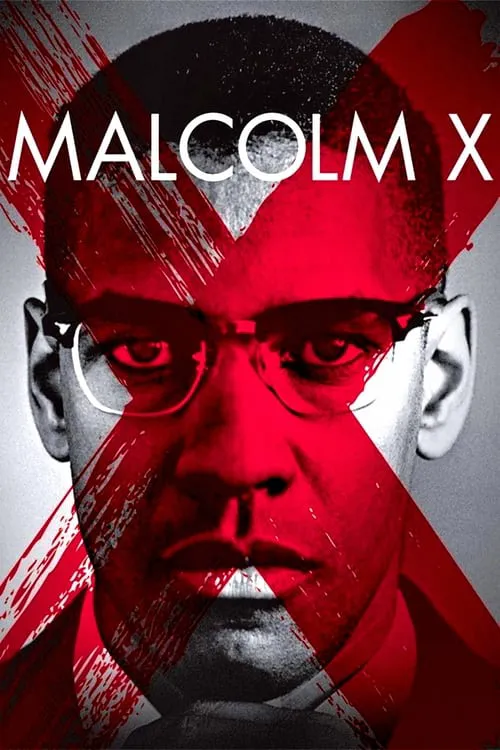Malcolm X

Plot
Malcolm X, directed by Spike Lee, is a historical drama film that chronicles the life of the influential African-American leader, Malcolm X. Released in 1992, the film is a tribute to Malcolm's life, struggles, and ultimate legacy. The film begins in 1940, following young Malcolm Little, an energetic and curious student from Boston. However, Malcolm's life takes a drastic turn after his father's death in 1943, leading to an unstable and often violent childhood. As Malcolm navigates his surroundings, he becomes increasingly influenced by the harsh realities of racism and segregation. Eventually, he drops out of school and engages in petty crimes. In 1946, Malcolm is arrested and sent to prison for burglary. It is during this six-to-ten year prison sentence that Malcolm undergoes a significant transformation. Influenced by a fellow inmate who reads to him from the Noble Quran, Malcolm becomes interested in the teachings of the Nation of Islam. This newfound interest sparks a deep understanding and connection within him, eventually solidifying his path towards a spiritual and intellectual renewal. Under the mentorship of Elijah Muhammad, Malcolm rapidly ascends the ranks within the Nation of Islam. Upon his release from prison in 1952, Malcolm returns to the world as Malcolm X, an enigmatic figure with a newfound sense of purpose. His charisma and conviction quickly capture the attention of his fellow congregants, propelling Malcolm towards becoming a respected leader within the organization. Malcolm's influence within the Nation of Islam, however, is not without controversy. As Malcolm gains popularity, he finds himself increasingly disillusioned with Elijah Muhammad's leadership. He begins to see through the facade of the Nation's leader and recognizes the inherent contradictions in his teachings. Despite his deep-seated connection to the Nation, Malcolm feels compelled to challenge its outdated and limiting ideologies. Malcolm's personal life, too, is filled with challenges. His marriage to Betty Sanders is a pivotal aspect of his life, providing stability in an often tumultuous environment. Malcolm's children also play a crucial role in shaping his identity, as he struggles to balance his desire for change with the need to provide a better future for his family. The midsection of the film focuses on Malcolm's eventual split with the Nation of Islam, marked by his break from Elijah Muhammad. This pivotal moment serves as a reflection of Malcolm's growth and self-awareness, as he begins to see the Nation for what it truly is. Malcolm's subsequent reformation is influenced by his connection to the African diaspora and his interest in international affairs. His journey towards a more inclusive and expansive vision marks a significant shift in his life's trajectory. The film's third act follows Malcolm's re-emergence as a leading figure in the Civil Rights movement. In a pivotal speech in Washington, D.C., Malcolm calls for change, urging black Americans to unite in the face of oppression. This call to action sets the stage for Malcolm's later involvement with the Organization of Afro-American Unity. Malcolm's later years are marked by controversy and violence. A series of confrontations, including a highly publicized speech in which he is attacked on stage, illustrate the increasing tensions between Malcolm and his former allies. The film culminates with Malcolm's tragic assassination on February 21, 1965, in New York City's Audubon Ballroom. Malcolm's death serves as a poignant reminder of the costs associated with his unwavering commitment to change. However, his legacy lives on, as the film concludes with Malcolm's widow, Betty, reflecting on the profound impact he had on her life and the lives of countless others. The final shot of the film is a poignant tribute to Malcolm's enduring spirit, as his voice – recorded just before his assassination – speaks to the future, urging his followers to continue the struggle for freedom and equality. Throughout the film, Spike Lee masterfully weaves a narrative that not only honors Malcolm's life but also delves into the complexities of his character. The film features powerful performances, particularly by Denzel Washington, who brings depth and nuance to the titular role. The narrative's structure and pacing are also noteworthy, skillfully balancing Malcolm's early life with his later years, while also highlighting the pivotal moments that defined his journey. In the end, Malcolm X is a film that not only explores the life of an iconic leader but also serves as a testament to the enduring power of Malcolm's message. The film concludes on a hopeful note, with Malcolm's legacy serving as a reminder of the importance of self-determination and racial pride.
Reviews
Recommendations




